




For ACT Alliance, 2023 was marked by significant achievements, partnerships, and collaborative efforts that underscored our commitment to building a more sustainable and just future for all Faced with increasing social and political polarization and shifting narratives, ACT’s commitment to human rights, inclusion and justice remained unwavering.
The geopolitical landscape has been marked by death and widespread destruction in Ukraine and Gaza, coupled with daunting economic challenges everywhere. Such events underscore the critical need for organisations like ACT Alliance to engage with moral and ethical crises globally. ACT plays a vital role in addressing both high-profile, widely recognized issues and those that are too often overlooked by the international community and donors.
As a global alliance, we pride ourselves on our agile and professional response to all manner of crises . We ensure that our reach extends to the marginalised and forgotten Our proactive approach to these challenges allows us to carve a distinctive niche in the humanitarian sector . We provide support and relief where it is needed most, regardless of the level of global attention. ACT’s proactive approach to its programmes, particularly humanitarian response, gender and climate justice, as well as migration and displacement, means that our efforts in these critical areas are continually transformed into action; action that reinforces capacity sharing, funding, and advocacy.
ACT’s journey in 2023 involved numerous organisational and programmatic changes, including a transitional funding model and
reform of the humanitarian mechanism . The decisive steps made in improving financial systems, enhancing human resource policies, and addressing colonial and racist legacies in our work demonstrate our dedication to becoming a more accountable and inclusive organisation.
To ensure the long-term viability of our Secretariat, we started developing the Future Funding Model 2026. This reflects our commitment to continue making a positive impact on a global scale. Discussions regarding a new membership model signalled our dedication to adapt our organisational structure for a more inclusive and robust future.
Our engagement in ecumenical and multireligious spaces included participation in the Lutheran World Federation General Assembly and the World Council of Churches Central Committee, and in the UN Multi-faith Advisory Council. Invitations to contribute to the G20 Interfaith Forum and the Pre-COP28 Faith Leaders’ Summit demonstrated our influence in shaping global conversations.
In summary, 2023 was a year of growth, resilience, and impactful collaboration for ACT Alliance. As we move forward, I am confident that our shared mission and collective efforts will continue to make a positive difference in the world

Ru delmar Bueno de Faria
The ACT Alliance is a faith-motivated, rights-based, impact-focused network committed to working ecumenically and inter-religiously. The communities we seek to serve and accompany are at the centre of our work.
ACT is the world’s largest ecumenical alliance engaged in humanitarian, advocacy and development work.
150 members
2 observer members
64% global south
30% global north
6% global
24,834 volunteers
73 Present in countries
46 forums
23,516 member staff
9,201 women
12,859 men
76 nonbinary 3,456 youth

Total $27,043,981






































The ACT Alliance Canada Forum created a pool of funds for projects in Eastern and Southern Africa. The alliance established a Locally Led Climate Fund (ACT – LLCF) with a representative governing structure that supports national and local climate action in these regions. It will soon be expanded to Western Africa.

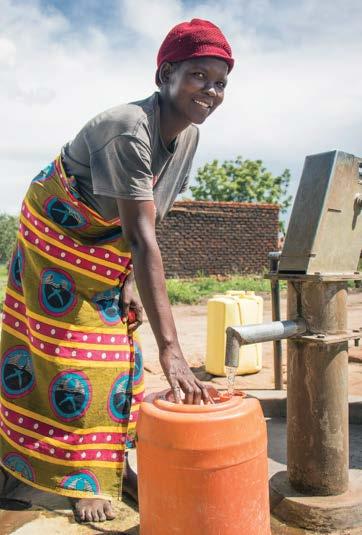
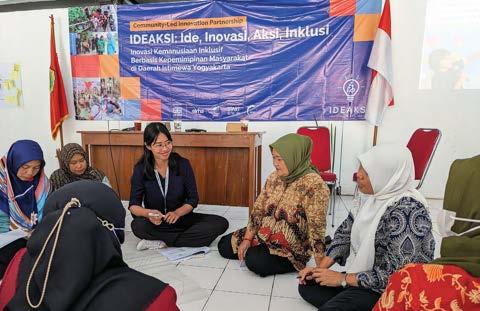
“In Indonesia, there were more than 3,000 disasters in 2023, overwhelmingly hydro meteorological disasters . These disproportionately affect women, girls and people with disabilities. Funding for loss and damage should reach them before it’s too late . ”
Jessica Novia of ACT Indonesian member YAKKUM; ACT COP28 delegate.




























































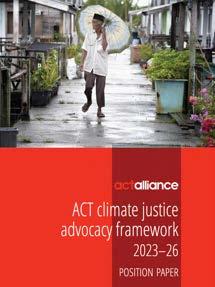

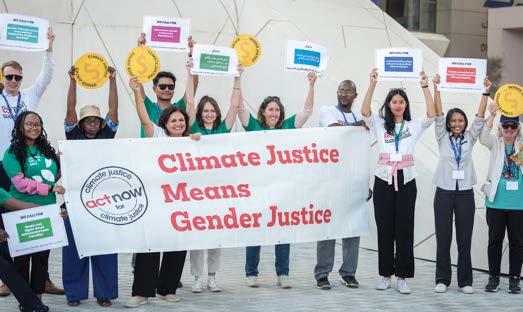
PHOTO: Paul Jeffrey/ACT





ACT members worldwide followed the COP28 Dubai negotiations virtually. They tracked adaptation, loss and damage funding, the Global Stocktake, human rights, mitigation, just transition and gender. Some ACT delegates who attended this Middle East COP in person advocated for climate and gender justice in Arabic as well as English, while others hosted an ACT side event.
The Climate Justice Advocacy Framework underlines the urgent need for concerted action by ACT members in building a global movement for climate justice. In 2023 it was updated by the ACT Climate Justice Reference Group and its member groups with guidance from the ACT Secretariat Climate Justice team.









































































ACT tailored training and resources to support gender policies in the Asia-Pacific Region. Theological papers on genderbased violence, sexual and reproductive health and rights, and economic justice were created with the Latin America and the Caribbean (LAC) Community of Practice. Regional security and gender training for members addressed the contextual risks of carrying out gender programmes.



















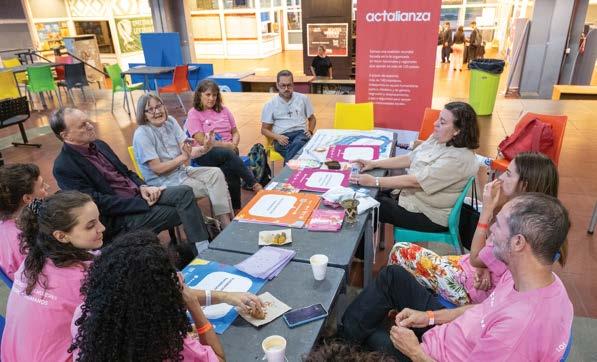




















ACT’s Gender Justice programme is “an innovative and multi-faceted approach leveraging the narrative of progressive faith actors . . . with outstanding achievements . . . as a progressive faith voice in global and national advocacy and policy spaces.”










ACT’s Gender Justice programme co-hosted the first Faith Changemakers inter-religious convention, in South Africa. Working with Act Ubumbano, Faith to Action Network and several multi-faith actors, the four-day event drew 200 participants. ACT delegates shared faith-based methods of transforming masculinities, advancing sexual and reproductive health and rights, and ending sexual and gender-based violence.







From the external evaluation of the ACT Alliance Gender Programme, 2023.




















































































ACT Alliance is a pivotal player in advancing sexual and reproductive health and rights and countering backlash to gender equality.









ACT developed a global briefing paper, facilitated alliance members’ advocacy participation and co-hosted a high-level side event at the UN Commission on Population and Development with Norway, Argentina, and the UN Population Fund .


Read more about the ACT Gender Justice Programme’s contributions on our dedicated LinkedIn page:














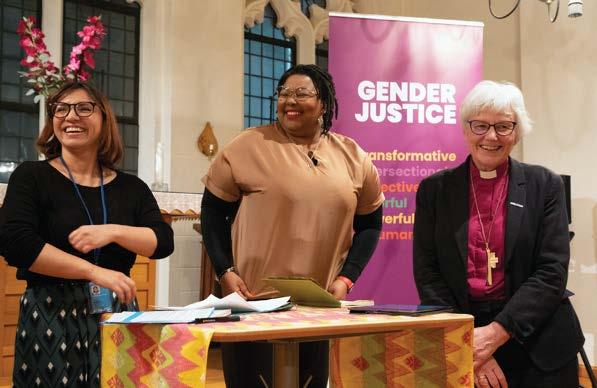


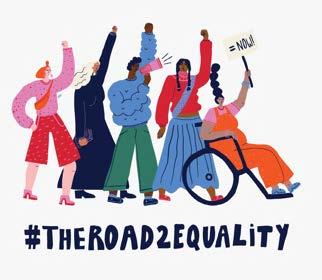













































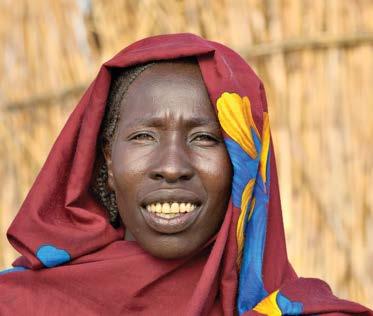






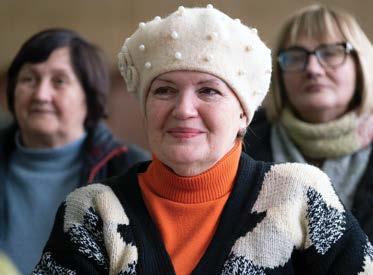
















By mid-2023 internal armed conflict in Sudan led to the displacement of more than 5 million people. A further 1 .1 million people sought refuge in the neighbouring countries of Ethiopia, South Sudan, Chad and Egypt. ACT members raised about USD 2 million for emergency support for the Internally Displaced Persons, returnees and refugees dispersed over the five countries.
The ongoing war in Ukraine has created the largest refugee crisis in Europe since WWII. In 2023 ACT members continued to provide psychological, spiritual and practical support for both those displaced to other countries or still in Ukraine. Survivors and the community are at the forefront of leading all ACTsupported processes .




































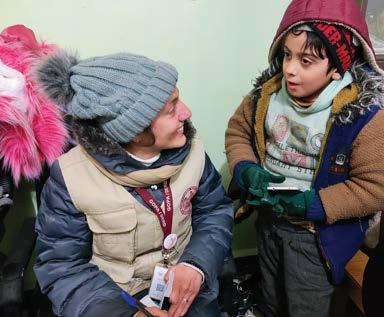








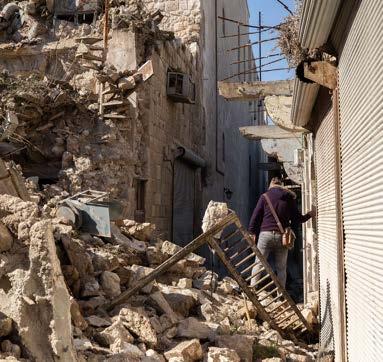




Both Syrian and Sudanese displaced people received cash assistance. Cash transfers are direct payments of money for humanitarian assistance, an effective, transparent and immediate way of supporting those in need while respecting their dignity. The focus moves from top-down “aid” to assistance and partnership with local communities.














ACT members, working with local agencies, responded to the urgent needs of Syrians displaced by a series of earthquakes in early February. HEKS/EPER helped repair subsidised public bakeries that had been damaged. The increased bread production ensured access to this staple for more than one million people The Middle East Council of Churches (MECC) rehabilitated six schools and other buildings, ensuring that more than 4,000 children could return to classes .
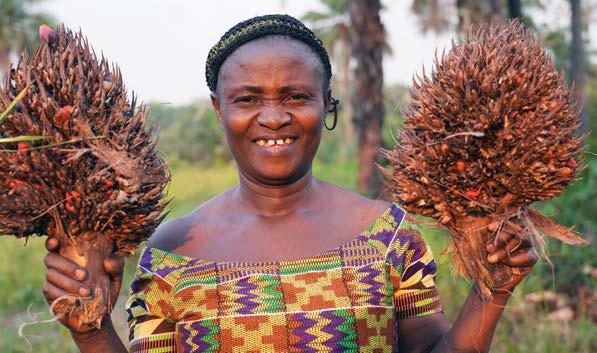
An innovative project led by the ACT Sierra Leone Forum has seen more than 200 men and boys become gender justice changemakers. Promoting Gender Transformative Approaches in Sierra Leone through Positive Masculinity addresses violence against women and girls and was developed with ACT’s Gender Justice programme.
Evidence shows that men and boys must be active allies in the struggle for gender equality. They can transform harmful gender norms and promote positive behaviours. The changemakers mentor and train other men and boys to advance gender equality in their communities and advocate for gender-balanced decision-making at local and national levels
Using a faith-based, community-driven approach, the project promotes the positive aspects of masculinity and aims for long-term behavioural change. The changemakers’ training includes working with women and girls to develop and practice inclusive, equitable, and sustainable approaches to gender justice. These approaches address the needs and rights of all individuals across the gender spectrum .
Canfeh and her husband are a gender model family, working as equal partners to support their family with the help of loans she accessed from the
supported
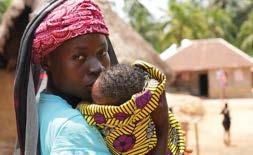
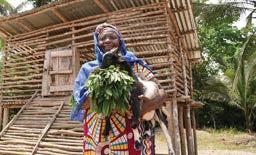
Gender-specific challenges Sierra Leone women face include:
• gender-based violence;
• limited access to higher education;
• restricted access to healthcare, linked to high maternal mortality rates. Sierra Leone has the worst maternal mortality ratio in the world.
• forced child marriages, including for girls as young as 12;
• limited access to employment, land ownership, and their own financial resources due to traditional gender roles; and,
• female genital mutilation, which has serious health risks and violates women’s and girls’ rights to bodily integrity and autonomy.
The project has led to the following transformations:
• Members of Positive Masculinity Clubs meet regularly to discuss and promote gender equality practices.
• Men and boys now challenge harmful traditional practices. This contributes to a broader cultural shift towards gender equality and reduces gender-based violence.
• Spouses model respectful and equitable relationships with their partners and families. Boys do the same with their families and friends.
• Males can better identify their emotions and seek support as needed. Communication skills and emotional wellbeing have improved.
• Men and boys’ greater involvement in caregiving and parenting promotes gender equality in the household.
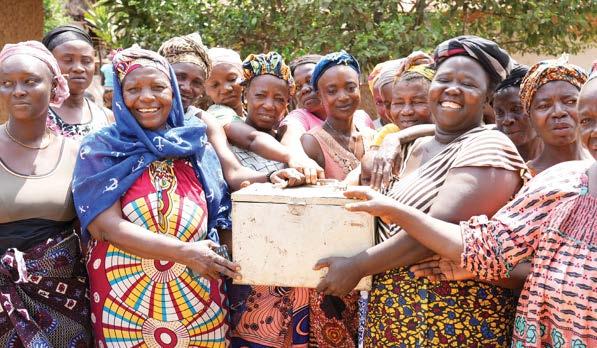
Latin American migrants climb up the side of an embankment to reach a ride. PHOTO: Sean Hawkey/ACT
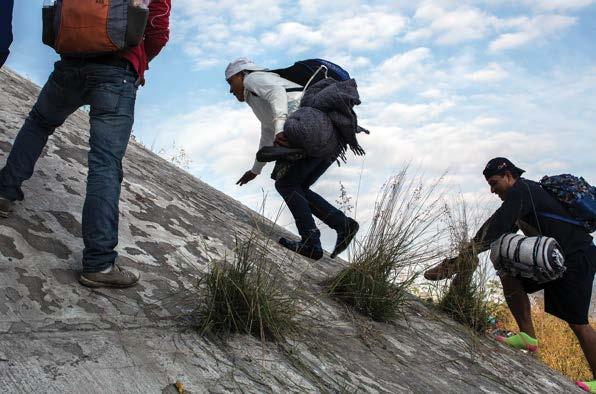
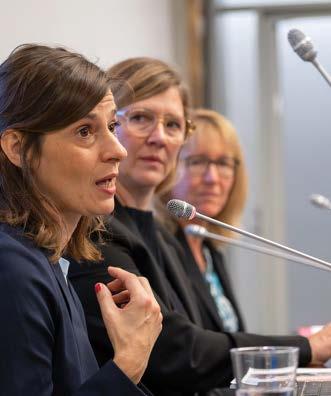
Climate change and migration is now a regional priority for ACT’s Latin America and the Caribbean (LAC) region. In 2023 LAC members formed the first ACT Community of Practice on Human and Climate Mobility and completed an initial mapping of their human mobility work.
The study Addressing the Protection Gap – Human Mobility and the Climate Crisis in International Frameworks was presented to decision-makers and members at global climate meetings in New York, Dubai and online. Advocates – including ACT members – learned how to best use international frameworks to make rightsbased progress for those displaced by the climate crisis .
The ACT Colombia Forum initiated a dialogue and advocacy project for peace and human rights protection . This included a mission to Chocó, on the country’s west coast. Members learned of the risks faced by repeatedly displaced communities and recorded community proposals for peace in the region .
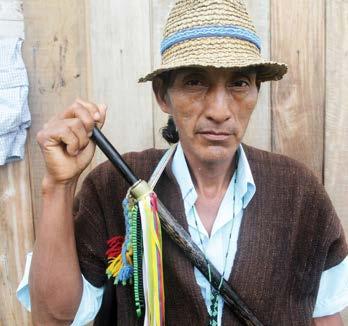
An Indigenous leader with his bastón, a sign of community leadership in Cacarica, Chocó. This peace community protects residents - returned displaced people who have witnessed violence - from local armed groups.
ACT members and forums in South Sudan, Cameroon, Ethiopia and Nigeria developed peace clubs, peace mediators and ambassadors, and engaged in community dialogues. The Zimbabwe Forum formed a Community of Practice on Justice, Peace and Reconciliation, held dialogues with paramilitary groups, created community peace structures, and engaged in election peace monitoring
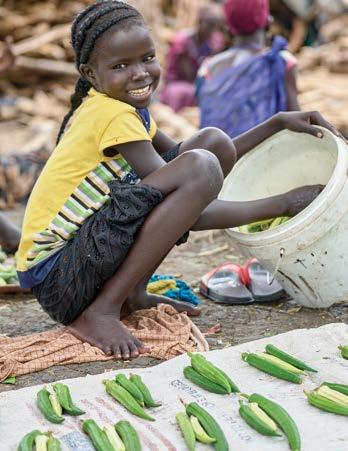
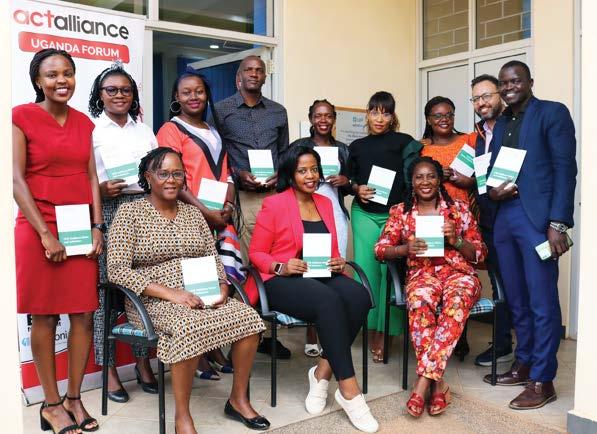
ACT Alliance provides members and forums with policy guidance and support around Quality, Accountability and Safeguarding.
Graduates of the Uganda Forum Quality, Accountability and Safeguarding workshop. Similar workshops were held in Kenya and the
With the support of Kerk in Actie, ACT members completed Phase One of a pilot programme to mentor selected national organisations through the Core Humanitarian Standards (CHS) self-assessment process. Four members, one each from Cuba, Haiti, Indonesia and Kenya, were selected through an application process to participate in Phase One. Phase Two of the programme began in December.
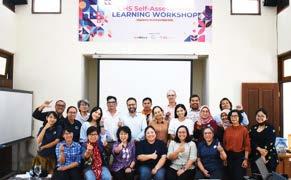
“Conducting a CHS self-assessment was a great opportunity for staff self-reflection on how to improve the quality of our response to affected communities and renew our commitment to more transparent accountability.”
Maria L. Navas Zorrilla, Cuban Council of Churches.
Forums are ACT’s vehicles to create meaningful change in the lives of communities in need.
In 2023, ACT Forums:
g Played a critical role in humanitarian response with numerous RRFs and appeals.
g Worked together on joint programming for the Gender Justice and Climate Justice programmes.
g Developed joint advocacy.
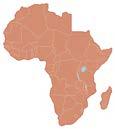
g The Canada Forum contributed significant funding for the Locally Led Climate Fund (LLCF), an innovative Climate Justice pilot project that supports climate advocacy in the east of Africa.
g The Ethiopia Forum worked jointly on Gender Justice and on Climate Justice through the LLCF. Members also established joint consortia to cooperate on focussed areas of work. This included four joint programming initiatives on the triple nexus of peace, development and humanitarian engagement.
g The Argentina Forum was very active on both Climate Justice and Gender Justice.
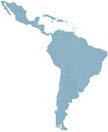
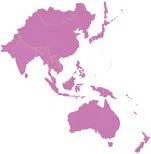
Asia and the Pacific
























































Report on the audit of the financial statements
Opinion
We have audited the financial statements of ACT Alliance - Action by Churches Together (the association), which comprise the balance sheet as at 31 December 2023, and the statement of income and expenditure, the movement in general reserves for the year then ended, and notes to the financial statements, including a summary of significant accounting polocies.
In our opinion, the accompanying financial statements comply with Swiss law and the association’s articles of incorporation.


Report on other legal and regulatory requirements
In accordance with article 69b
connection with article 728a paragraph 1
and PS-CH 890, we confirm that an internal control system exists which has been designed for the preparation of the financial statements according to the instructions of the Governing Board.
We recommend that the financial statements submitted to you be approved.
































































































Members of ACT’s Reference Groups play a vital role in setting the direction of ACT Alliance’s work. In 2023, the Emergency Preparedness and Humanitarian Response Reference Group made substantial contributions to improving ACT’s humanitarian mechanisms.
Advocacy and Policy
Chairs
Eva Ekelund (Act Church of Sweden)
Philemon Jazi (Diakonia Sweden)
Climate Justice
Chairs
Elena Cedillo (Lutheran World Federation)
Mattias Söderberg (DanChurchAid)
Emergency Preparedness and Humanitarian Response
Chairs
Hilda Timmermann (Kerk in Actie)
Joseph Sahayam (CASA)
Gender Justice
Chairs
Palwashay Arbab (CWSA)
Yordanos Asnake Sisay (EOC–DICAC)
Ranan Issa Abu Shanab (CWSA)
Migration and Displacement
Chair
Andrew Fuys (Church World Service)
Peace and Human Security
Chairs
Nishant Neel (CASA)
Tanya Viiki (Felm)
Quality and Accountability/ Complaints Handling
Chairs
Coleen Heemskerk (Act Church of Sweden)
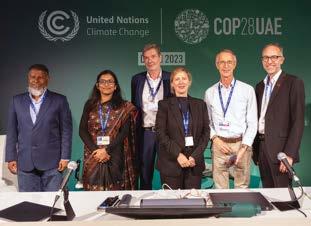
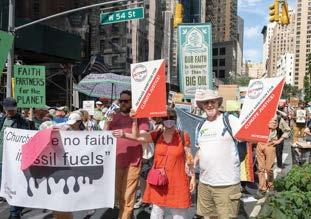
US members facilitated ACT and its partners’ participation in the 2023 New York Climate March linked to the UN Climate Summit.
John Gilmore (COCOA) Communities of Practice (CoPs)
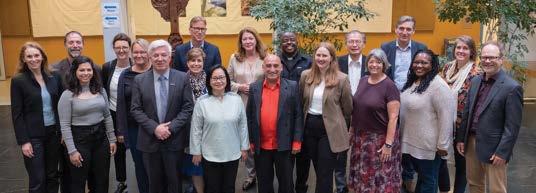
Officers
Moderator
Mr Erik Lysén
Act Church of Sweden (ActCoS)
Vice Moderator
Ms Minnie Anne Mata-Calub
National Council of Churches in the Philippines (NCCP)
Treasurer
Ms Simangaliso Hove
Lutheran Development Service in Zimbabwe (LDS Zimbabwe)
Executive Committee
Rev Sally Azar
[Youth] Evangelical Lutheran Church in Jordan and the Holy Land (ELCJHL)
Ms Maria Immonen
Lutheran World Federation (LWF)
Rev Dr Laurie Ann Kraus
Presbyterian Disaster AssistancePresbyterian Church USA (PDA)
Lic. Nicolás Rosenthal
Diaconal Protestant Foundation Time to Work/Fundacion Protestante Hora de Obrar (FPHdO)
Permanent seats
Ms Maria Immonen
Lutheran World Federation (LWF)
Prof. Isabel Apawo Phiri
World Council of Churches
Africa
Ms Simangaliso Hove
Lutheran Development Service in Zimbabwe (LDS Zimbabwe)
Rev Dr Evans Onyemara
Christian Council of Nigeria (CCN)
Mr Yilikal Shiferaw
Ethiopian Orthodox Church (EOCDICAC)
Asia
Ms Karen M. Janjua
Community World Service Asia (CWSA)
Mr Sungjae Kim
The National Christian Council in Japan (NCCJ)
Ms Minnie Anne Mata-Calub National Council of Churches in the Philippines (NCCP)
Europe
Mr Martin Kessler
Diakonie Katastrophenhilfe (DKH)
Mr Erik Lysén
Act Church of Sweden (ActCoS)
Ms Rommie Nauta Kerk in Actie (KiA)
Europe (Eastern)
Ms Tsovinar Ghazarya
Armenia Inter-Church Charitable Round Table Foundation (ART)
Latin America and the Caribbean
Ms Judith Castañeda
Protestant Center for Pastoral Studies in Central America/Centro Evangélico de Estudios pastorales en Centro América (CEDEPCA)
Mr Joel Ortega Dopico
Council of Churches of Cuba (CCC) / Consejo de Iglesias de Cuba (CIC)
Lic. Nicolás Rosenthal
Diaconal Protestant Foundation Time to Work/Fundacion Protestante Hora de Obrar (FPHdO)
The Middle East
Rev Dr Rima Nasrallah
Middle East Council of Churches (MECC)
North America
Rev Dr Laurie Ann Kraus
Presbyterian Disaster AssistancePresbyterian Church USA (PDA)
Mr Guy Smagghe
Presbyterian World Service and Development (PWS&D)
Pacific Nations, Australia and Aotearoa New Zealand
Ms Leah Odongo
Australian Lutheran World Service (ALWS)
Youth
Rev Sally Azar
Evangelical Lutheran Church in Jordan and the Holy Land (ELCJHL)
Ms Embla Regine Mathisen NCA - Changemaker Norway
Global
Ms Casey Harden
World Young Women's Christian Association (World YWCA)
Membership and Nominations Committee
Chair: Ms Marie Anne Sliwinski
Evangelical Lutheran Church in America (ELCA)
Mr Patrick Watt
Christian Aid (CA)
Ms Joanne (Jo) Knight
Anglican Overseas Aid - Australia (AOA)
Mr Lorenzo Mota King
Social Service of Dominican Churches/ Servicio Social de Iglesias Dominicanas (SSID)
Angola Angolan Council of Christian Churches/Conselho de Igrejas Cristãs em Angola (CICA)
Burkina Faso Dignus Burkina Faso (DIGNUSBF)
Burundi National Council of Churches of Burundi/ Conseil national des églises du Burundi (CNEB)
Cameroon Church of the Lutheran Brethren of Cameroon/Eglise fraternelle luthérienne du Cameroun (EFLC)
DRC Church of Christ in the Congo Kinshasa/Eglise du Christ au Congo Kinshasa (ECC)
DRC Ecumenical Center Promotion Rural World/Centre Oecuménique pour la Promotion du Monde Rural (COPROMOR)
DRC Ecumenical Office for Development Support/Bureau Oecumenique d’Appui au Developpement (BOAD)
DRC Evangelical Lutheran Church of Congo/Eglise évangélique luthérienne au Congo (ELCCo)
Ethiopia Ethiopian Evangelical Church
Mekane Yesus (EECMY)
Ethiopia Ethiopian Orthodox Church Development and Inter-Church Aid Commission (EOC-DICAC)
Ghana Presbyterian Relief Services and Development-Presbyterian Church of Ghana (PRSD)
Kenya Anglican Development Services Kenya (ADS)
Kenya Fellowship of Christian Councils and Churches in the Great Lakes and Horn of Africa (FECCLAHA)
Kenya Kenya Evangelical Lutheran Church (KELC)
Kenya National Council of Churches of Kenya (NCCK)
Kenya Presbyterian Church of East Africa (PCEA)
Lesotho Christian Council of Lesotho (CCL)
Liberia Liberia Council of Churches (LCC)
Liberia Lutheran Development Service in Liberia (LDS Liberia)
Madagascar Church of Jesus Christ in Madagascar/Eglise de Jésus-Christ à Madagascar (SAF-FJKM)
Madagascar Malagasy Lutheran Church (MLC)
Malawi Churches Action in Relief and Development (CARD Malawi)
Malawi Evangelical Lutheran Development Service (ELDS)
Mozambique Ecumenical Committee for Social Development/Comité Ecuménico para o Desenvolvimento Social (CEDES)
Nigeria Christian Council of Nigeria (CCN)
Sierra Leone Council of Churches in Sierra Leone (CCSL)
South Africa ACT Ubumbano
South Africa Economic Justice Network of Fellowship of Christian Councils in Southern Africa (EJN-FOCCISA)
South Africa Evangelical Lutheran Church in Southern Africa (ELCSA-DS)
South Africa Lutheran Communion in South Africa (LUCSA)
South Sudan Presbyterian Relief & Development Agency (PRDA)
Tanzania Christian Council of Tanzania (CCT)
Tanzania Evangelical Lutheran Church in Tanzania (ELCT)
Tanzania Tanganyika Christian Refugee Service (TCRS)
Uganda Church of Uganda (CoU)
Uganda Rural Action Community Based Organisation (RACOBAO)
Uganda Uganda Joint Christian Council (UJCC)
Zambia Council of Churches in Zambia (CCZ)
Zambia The United Church of Zambia (UCZ)
Zimbabwe Ecumenical Church Leaders’ Forum (ECLF)
Zimbabwe Lutheran Development Service in Zimbabwe (LDS Zimbabwe)
Zimbabwe Methodist Development and Relief Agency (MeDRA)
Zimbabwe Zimbabwe Council of Churches (ZCC)
Bangladesh Christian Commission for Development in Bangladesh (CCDB)
Cambodia Life With Dignity (LWD)
China Amity Foundation (AF)
India Christian Agency for Rural Development (CARD India)
India Church’s Auxiliary for Social Action (CASA)
India Lutheran World Service India Trust (LWSIT)
India Synodical Board of Social Services, Church of North India (SBSS-CNI)
India United Evangelical Lutheran Churches in India (UELCI)
Indonesia Centre for Disaster Risk Management and Community Development Studies (CDRM&CDS)
Indonesia Christian Foundation for Public Health (YAKKUM), includes YEU
Indonesia Indonesian Christian Association for Health Services (ICAHS/ PELKESI)
Indonesia Maha Bhoga Marga Foundation (MBM)
Japan National Christian Council in Japan (NCCJ)
Korea (South) Presbyterian Church in the Republic of Korea (PROK)
Pakistan Community World Service Asia (CWSA Pakistan)
Pakistan National Council of Churches in Pakistan (NCCP)
Philippines National Council of Churches in the Philippines (NCCP)
Sri Lanka National Christian Council of Sri Lanka (NCCSL)
Taiwan Presbyterian Church in Taiwan (PCT)
Armenia Armenia Inter-Church Charitable Round Table Foundation (ARTF)
Austria Diakonie ACT Austria
Belgium Solidarité Protestante (SP)
Czech Republic Diaconia ECCB – Center of Relief and Development (DECCB CRD)
Denmark DanChurchAid (DCA)
Finland Finn Church Aid/Kirkon Ulkomaanapu (FCA)
Finland Finnish Evangelical Lutheran Mission (Felm)
Germany Bread for the World (BfdW)
Germany Diakonie Katastrophenhilfe (DKH)
Germany Mission EineWelt (MEW)
Germany Moravian Mission Society/ Herrnhuter Missionshilfe (HMH)
Greece APOSTOLI
Greece Faros
Hungary Hungarian Interchurch Aid (HIA)
Iceland Icelandic Church Aid (ICA)
Norway Norwegian Church Aid (NCA)
Romania Ecumenical Association of Churches in Romania (AIDRom)
Russia Russian Orthodox ChurchDepartment for External Church Relations (ROC-DECR)
Serbia Ecumenical Humanitarian Organization (EHO)
Serbia Philanthropy -The Charitable Foundation of the Serbian Orthodox Church (COVEX/COVEC)
Sweden Act Church of Sweden (ActCoS)
Sweden Diakonia Sweden
Switzerland Swiss Church Aid (HEKSEPER) merged with BfA
The Netherlands Cordaid (merged with ICCO Cooperation)
The Netherlands Kerk in Actie (KiA)
UK Christian Aid (CA)
Argentina Diaconal Protestant Foundation Time to Work/Fundacion Protestante Hora de Obrar (FPHdO)
Argentina Evangelical Center for Diaconia/Servicio Evangélico de Diaconia (SEDI)
Argentina Regional Ecumenical Advisory and Service Center/Centro Regional Ecuménico de Asesoría y Servicio (CREAS)
Bolivia Bolivian Association Uniting Hands for Life/Asociación Boliviana Uniendo Manos por la Vida (RED UMAVIDA)
Bolivia Evangelical Methodist Church in Bolivia/Iglesia Evangélica Metodista en Bolivia (IEMB)
Brazil Diaconia Brazil
Brazil Ecumenical Coordination of Services/Coordenadoria Ecumênica de Serviço (CESE)
Brazil KOINONIA Ecumenical Presence and Service/KOINONIA Presença Ecuménica e Serviço
Brazil Lutheran Foundation of Diaconia/ Fundação Luterana de Diaconia (FLD)
Chile Evangelical Lutheran Church in Chile/Iglesia Evangélica Luterana en Chile (IELCH)
Chile Popular Education in Health/ Fundación Educación Popular en Salud (EPES)
Colombia Evangelical Lutheran Church of Colombia/Iglesia Evangélica Luterana de Colombia (IELCO)
Colombia Presbyterian Church of Colombia/Iglesia Presbiteriana de Colombia (PCC/IPC)
Cuba Christian Center for Reflection & Dialogue/Centro Cristiano de Reflexión y Diálogo (CCRD)
Cuba Council of Churches of Cuba (CCC) / Consejo de Iglesias de Cuba (CIC)
Dominican Rep. Social Service of Dominican Churches/Servicio Social de Iglesias Dominicanas (SSID)
El Salvador Christian Association for Education and Development/Asociación Cristiana de Educación y Desarrollo (ALFALIT)
El Salvador Salvadorian Lutheran Synod/ Sinodo Luterano Salvadoreño (SLS)
Guatemala Protestant Center for Pastoral Studies in Central America/Centro Evangélico de Estudios pastorales en Centro América (CEDEPCA)
Haiti Christian Service Haiti/Service chrétien d’Haïti (SCH)
Honduras Christian Organization for the Integral Development of Honduras/ Organismo Cristiano de Desarrollo Integral de Honduras (OCDIH)
Honduras Mennonite Social Action Commission/Comisión de Acción Social Menonita (CASM)
Nicaragua Council of Evangelical Churches/Consejo de Iglesias Proalianza Denominacional (CEPAD)
Nicaragua Interchurch Center for Theological and Social Studies/Centro Intereclesial de Estudios Teológicas y Sociales (CIEETS)
Nicaragua Nicaraguan Lutheran Church of Faith and Hope/Iglesia Luterana de Nicaragua Fe y Esperanza (ILFE)
Peru DIACONIA Peru
Peru Methodist Church of Peru (MCP)/ Iglesia Metodista del Peru (IMP)
Egypt Bishopric of Public, Ecumenical & Social Services (BLESS)
Jordan Evangelical Lutheran Church in Jordan and the Holy Land (ELCJHL)
Lebanon Middle East Council of Churches (MECC)
Palestine Department of Service to Palestinian Refugees (DSPR)
Palestine East Jerusalem YMCA (EJ-YMCA)
Syria Greek Orthodox Patriarchate of Antioch & All the East –Department of Ecumenical Relations and Development (GOPA-DERD)
Syria St. Ephrem Patriarchal Development Committee (EPDC)
Canada Canadian Lutheran World Relief (CLWR)
Canada Presbyterian World Service and Development (PWS&D)
Canada The Primate’s World Relief and Development Fund (PWRDF)
Canada United Church of Canada: Justice, Global and Ecumenical Relations Unit (UCC-Canada)
USA Church World Service (CWS-USA)
USA Evangelical Lutheran Church in America (ELCA)
USA Presbyterian Disaster Assistance-
Presbyterian Church USA (PDA)
USA United Church of Christ (UCC)
USA United Methodist Committee on Relief (UMCOR)
USA/Canada Christian Church (Disciples of Christ) Week of Compassion
USA/Canada World Renew (WR)
Australia Act for Peace (AfP)
Australia Anglican Overseas Aid (AOA)
Australia Anglicans in Development (ABM-AID)
Australia Australian Lutheran World Service (ALWS)
Australia Churches of Christ Overseas Aid (COCOA)
Australia UnitingWorld Relief and Development Unit (UWRDU)
New Zealand Christian World Service (CWS NZ)
Canada World Association for Christian Communication (WACC)
Germany United Evangelical Mission (UEM)
Germany World Communion of Reformed Churches (WCRC)
Switzerland ECLOF International (ECLOF)
Switzerland Mission 21: Protestant
Mission Basel (Mission 21)
Switzerland World Young Women’s Christian Association (World YWCA)
UK Anglican Alliance (member since 2013 as observer)
UK The Salvation Army (SA)
USA Baptist World Aid (BWA)
Switzerland The Lutheran World Federation (LWF)
Belgium Conference of European Churches (CEC)
Switzerland World Student Christian Federation (WSCF)
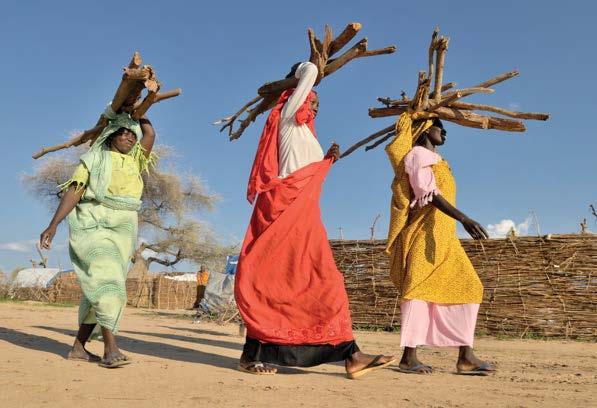
Women living in a South Darfur camp for internally displaced persons bring home harvested wood. PHOTO: Paul Jeffrey/ACT
ACT Offices Contact Information
ACT Alliance Amman Rachel Luce Regional Representative - Middle East and North Africa Tel: +962 79 930 8191 rachel.luce@actalliance.org
ACT Alliance Bangkok Alwynn Javier Regional Representative - Asia and the Pacific Tel: +66 2 214 5163 alwynn.javier@actalliance.org
ACT Alliance Geneva Gabriela Annequin Procurement & Logistics Officer Tel: +41 22 791 6242 actcom@actalliance.org
ACT Alliance Nairobi Elizabeth Kisiigha Zimba Regional Representative - Africa Tel: +254 722 848 413 elizabeth.zimba@actalliance.org
ACT Alliance New York Alison Kelly UN Representative Tel: +1 347 443 4434 alison.kelly@actalliance.org
ACT Alliance Bogota Claudia Espinosa Regional Representative - Latin America and the Caribbean Tel: +57 322 8835944 claudia.espinosa@actalliance.org
ACT Alliance Toronto Simon Chambers Director of Communications Tel: +1 416 435 0972 simon.chambers@actalliance.org
actalliance .org
42 Chemin du Pommier (Kyoto) CH-1218 Le Grand Saconnex, Geneva, Switzerland
ACT Alliance EU Floris Faber Director of ACT Alliance EU Tel: +32 2234 5660 admin@actalliance.eu Website: https://actalliance.eu actalliance.org @actalliance facebook.com/actalliance